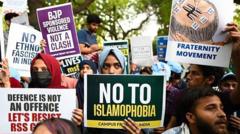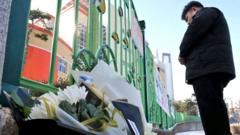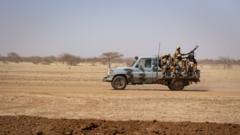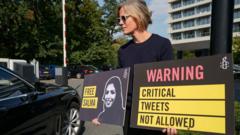A recent UN report details the extensive violence in Bangladesh, estimating up to 1,400 fatalities during protests against the former government. Human rights investigators suggest that the government's response to dissenters could be classified as crimes against humanity.
Bangladesh: UN Warns Hasina's Actions May Constitute Crimes Against Humanity
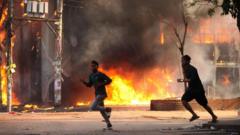
Bangladesh: UN Warns Hasina's Actions May Constitute Crimes Against Humanity
UN investigators report that the crackdown on protests in Bangladesh could be classified as a crime against humanity, as violence escalates dramatically.
The unrest in Bangladesh reached unprecedented levels last year with mass demonstrations, precipitated by a controversial police crackdown on student-led efforts aimed at reforming job quotas. As social discontent grew, the UN's investigations documented severe allegations against the security forces, asserting an “official policy” to repress opposition violently.
Among the casualties, children were disproportionately affected, as estimates indicate that up to 13% of the fatalities were minors. The report also addresses the violence orchestrated against individuals seen as supporters of the former Beautification government and against various religious and ethnic groups.
The report signifies a pointed critique of Sheikh Hasina, who ruled Bangladesh for 15 years before escaping to India amid intensifying accountability measures. Bangladesh's interim leadership requested this examination, signaling a crucial moment for the nation's human rights considerations.
The shocking details encapsulated in the UN's report call for broader investigations into the violent incidents to ensure that future accountability encompasses not just state forces, but also the protection of marginalized communities.
The escalating political crisis has resulted in a now-controversial arrest warrant for Hasina as the country grapples with unprecedented civil unrest that threatens stability and human rights across the region.
Among the casualties, children were disproportionately affected, as estimates indicate that up to 13% of the fatalities were minors. The report also addresses the violence orchestrated against individuals seen as supporters of the former Beautification government and against various religious and ethnic groups.
The report signifies a pointed critique of Sheikh Hasina, who ruled Bangladesh for 15 years before escaping to India amid intensifying accountability measures. Bangladesh's interim leadership requested this examination, signaling a crucial moment for the nation's human rights considerations.
The shocking details encapsulated in the UN's report call for broader investigations into the violent incidents to ensure that future accountability encompasses not just state forces, but also the protection of marginalized communities.
The escalating political crisis has resulted in a now-controversial arrest warrant for Hasina as the country grapples with unprecedented civil unrest that threatens stability and human rights across the region.










